Do you find yourself waking up in a cold sweat after having a violent dream? If you keep having violent dreams, they may be trying to tell you something. This article will explore the meaning behind “i keep having violent dreams” and give you insight into what your dreams may be trying to tell you.
What are Dreams?
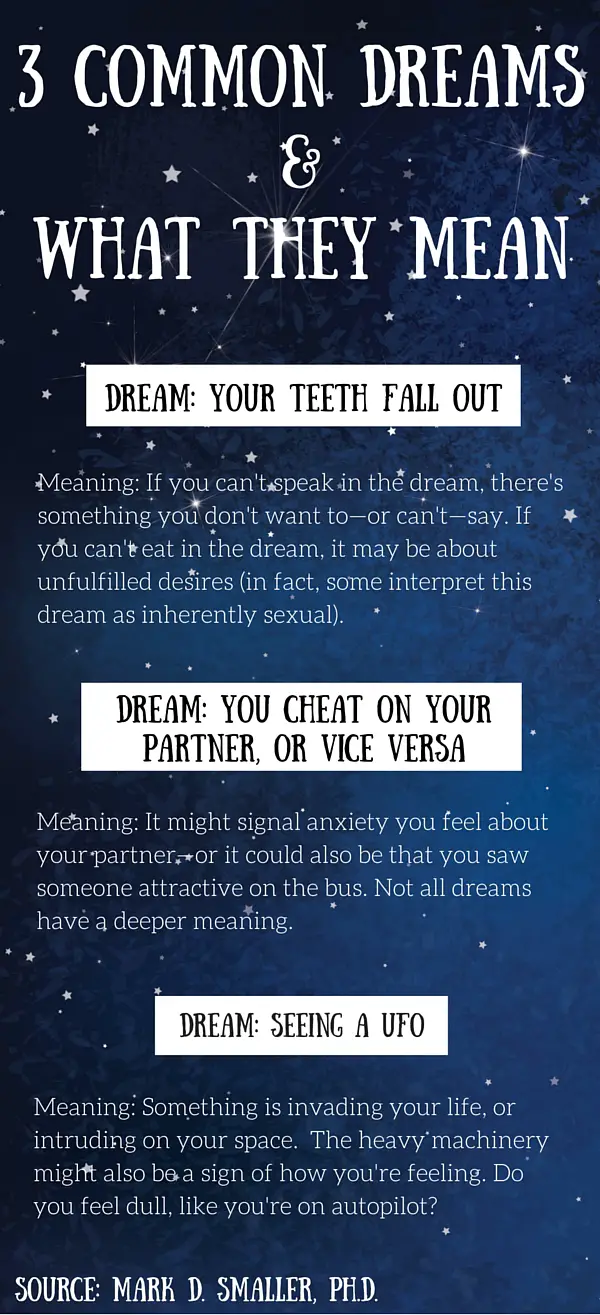
Dreams are a series of images, sounds, thoughts, and feelings that occur involuntarily in the mind during certain stages of sleep. Dreams can be pleasant or unpleasant, realistic or surreal, and can provide insight into one’s subconscious. They are often associated with memories and events from the day prior and can be a reflection of one’s thoughts, emotions, and desires.
Types of Dreams

- Lucid Dreams: Lucid dreaming is when one is aware that they are dreaming, and can control their experience in the dream.
- Prophetic Dreams: Prophetic dreams are dreams that are believed to predict the future in some way.
- Nightmares: Nightmares are vivid, often disturbing dreams that cause strong negative emotions.
- Recurring Dreams: Recurring dreams are dreams that occur over and over again.
- Daydreams: Daydreams are a type of dream that usually occurs when one is awake and daydreaming.
- Stress Dreams: Stress dreams are dreams that occur as a result of stress, anxiety, or trauma.
Causes of Violent Dreams

Stress and Anxiety
Stress and anxiety can cause vivid, intense dreams, including violent ones. During REM sleep, the brain is more active, which may lead to stronger dreams. Stress can lead to an increase in adrenaline, which may make dreams more vivid and intense.
Trauma
Trauma can also cause violent dreams. Trauma can be physical or emotional, such as abuse, a car accident, or a natural disaster. It may cause nightmares or flashbacks, which can be intense and vivid, and can include violence.
Unresolved Conflict
Unresolved conflict can also trigger violent dreams. These dreams can be a way for the brain to process and work through the conflict. The violence in the dream may be a way of expressing anger or fear related to the conflict.
Effects of Violent Dreams
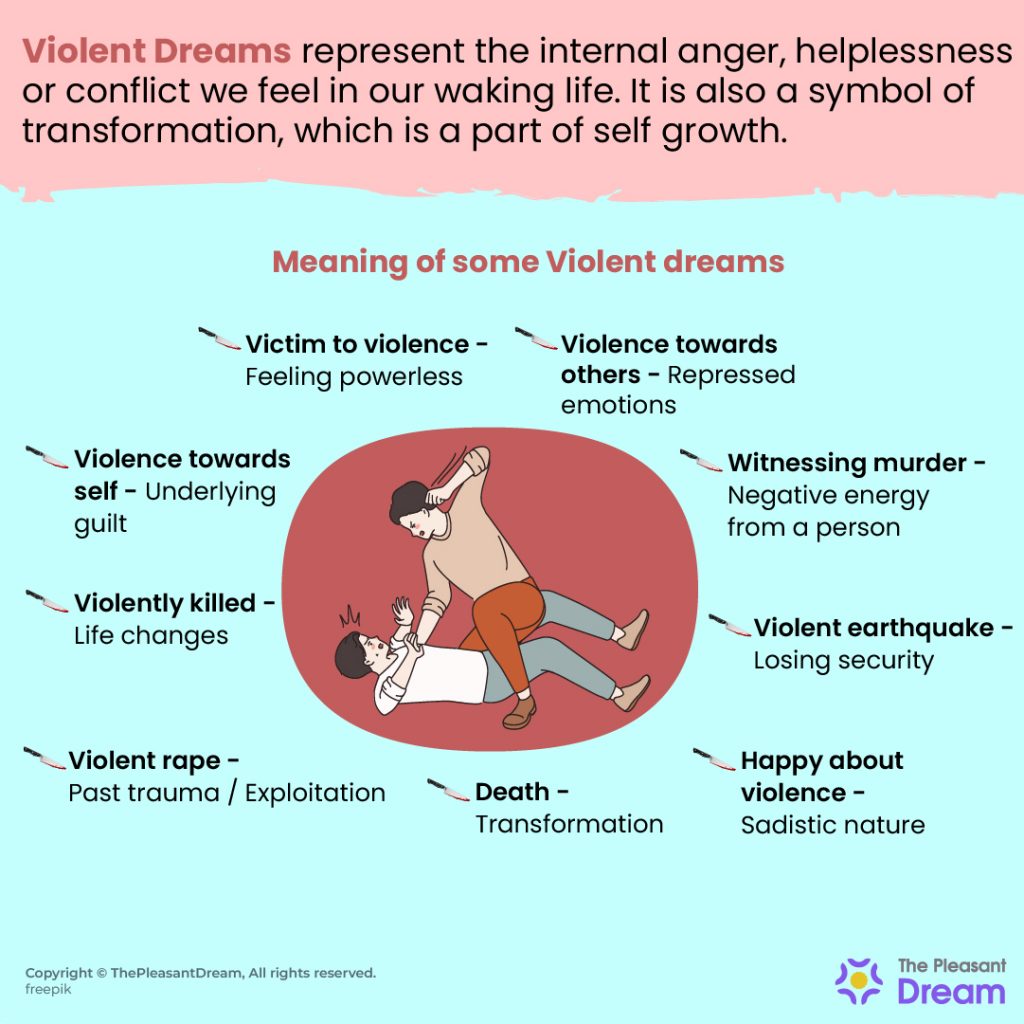
Nightmares
Nightmares are a form of sleep disturbance characterized by intense negative emotions or fear. Common themes of nightmares include being chased, falling, being harmed, or witnessing a traumatic event. Such dreams can be extremely distressing, leading to feelings of anxiety, fear, and depression.
Sleep Disturbance
Violent dreams can also lead to sleep disturbances, such as difficulty falling or staying asleep, or frequent awakenings during the night. This can result in daytime sleepiness, poor concentration, and difficulty functioning throughout the day. Sleep disturbances can exacerbate existing mental health issues and lead to further psychological distress.
3. Anxiety
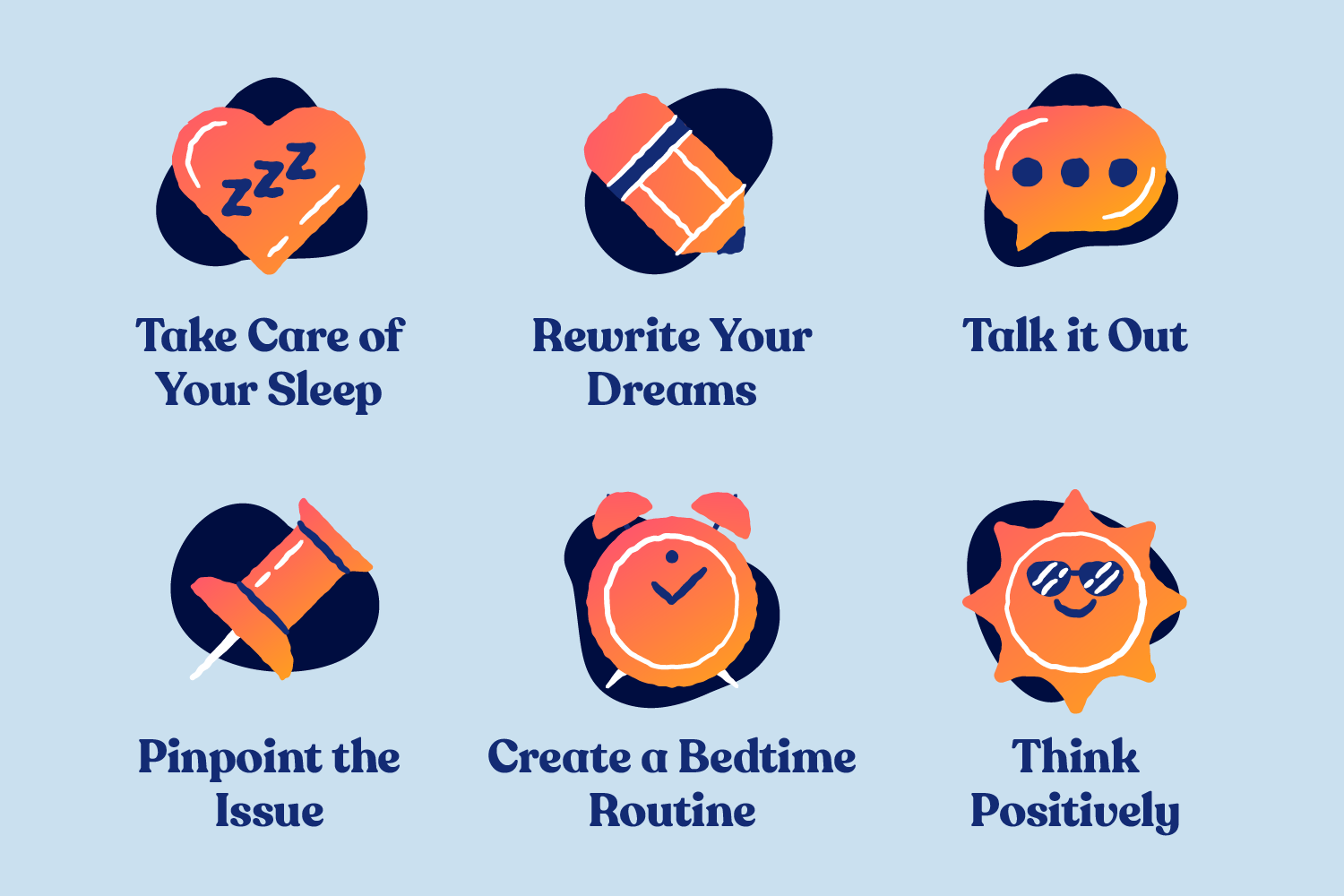
Violent dreams can be caused by underlying anxiety. It is important to address the source of this anxiety, as it can cause significant disruption to day-to-day life. Anxiety can be caused by a variety of factors, such as stress, trauma, depression, or a medical condition. If you are experiencing violent dreams, it is important to seek professional help to identify and treat the underlying anxiety. Cognitive Behavioral Therapy (CBT) and other forms of therapy can be effective in treating anxiety. Additionally, lifestyle changes such as exercising regularly, getting adequate sleep, and practicing mindfulness can help reduce anxiety levels.
Coping Strategies
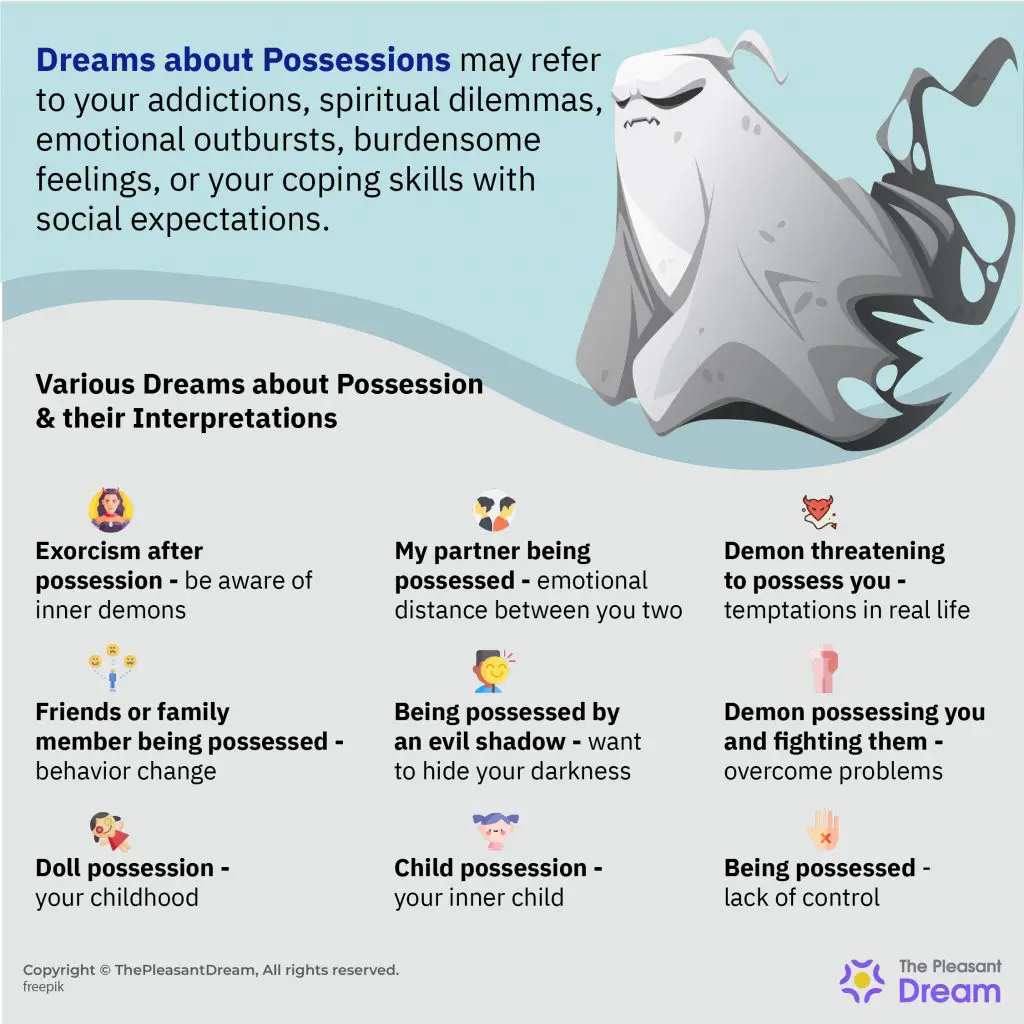
- Talk to a mental health professional.
- Practice relaxation techniques such as meditation, yoga, or deep breathing.
- Exercise regularly to help manage stress.
- Limit your exposure to media that contains violent images.
- Engage in activities that bring you joy, such as art or music.
- Find healthy outlets for your emotions such as talking to a friend, journaling, or expressing yourself through art.
- Explore the underlying cause of your violent dreams. If necessary, seek the help of a mental health professional.
1. Talk Therapy

| Pros | Cons |
|---|---|
| Talking about your issues can help you understand them better. | It can take a long time for therapy to be effective. |
| Therapy can lead to better communication with family and friends. | It may be expensive and not covered by insurance. |
| You can learn new coping strategies and develop healthier habits. | It may be difficult to find a therapist and it takes time to build trust. |
Talk therapy, also known as psychotherapy, is the process of talking about your thoughts, feelings, and behaviors in order to gain insight into your mental health and learn coping strategies. A good therapist will be able to help you understand the underlying causes of your violent dreams and develop healthier habits to deal with them. Talk therapy can also lead to better communication with family and friends. However, therapy may be expensive and not covered by insurance, and it can take a long time for it to be effective. It may also be difficult to find a therapist and it takes time to build trust with them.
2. Stress Management
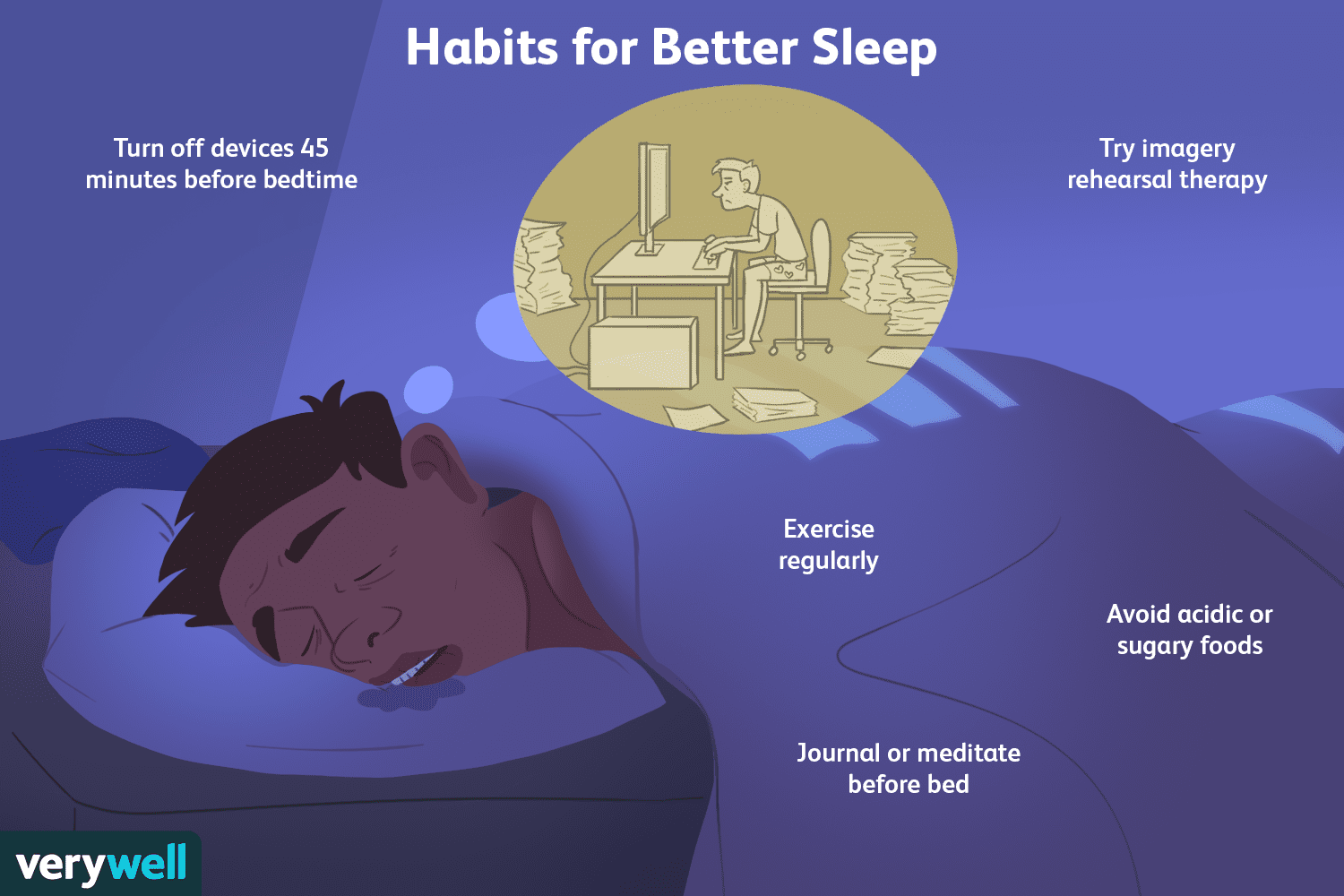
Having violent dreams can be a sign of increased stress levels. It is important to identify the sources of stress in your life and find ways to manage it. It could be a certain situation, relationship, or environment that is causing you stress. Once you have identified the source, look for ways to reduce the stress. This could include talking to someone about the situation, creating a plan to tackle it, or taking breaks from it. Additionally, practicing relaxation techniques like yoga, deep breathing, or meditation can help to reduce stress levels. Making lifestyle changes to get adequate sleep, nutrition, and exercise can also help to reduce stress levels.
3. Self-Care
Practice and prioritize self-care. Consider activities such as yoga, meditation, journaling, and engaging in creative pursuits. This can help to reduce stress, create a sense of control, and provide opportunities for self-expression. Make sure to get enough sleep, eat healthily, and spend time with supportive people. Consider talking to a therapist or counselor if necessary.
Professional Help
| Reasons to Seek Professional Help | Options Available |
|---|---|
| Violent dreams can be caused by psychological issues, such as post-traumatic stress, anxiety, depression, or substance use disorder. | Psychotherapy, such as cognitive-behavioral therapy, can help people identify the source and address the underlying issues causing the violent dreams. |
| Medical conditions, such as stress-related insomnia, can also cause violent dreams. | Medication, such as antidepressants or sedatives, may help to reduce the frequency of the violent dreams. |
| Other times, violent dreams may be the result of traumatic experiences. | In these cases, counseling and support can help the individual to process their experiences and restore emotional wellbeing. |
Professional help can be extremely beneficial in addressing violent dreams. People should consider seeking professional help if they experience recurrent, violent dreams, especially if the dreams are causing them distress or disrupting their sleep.
Frequently Asked Questions
What could be the cause of my violent dreams?
Violent dreams can be caused by a variety of factors, including stress, anxiety, unresolved trauma, mental health disorders, and certain medications. Stressful events, such as a major life change or a traumatic experience, can cause violent dreams. Anxiety can lead to heightened emotions, which can manifest in the form of nightmares and violence. Unresolved childhood trauma, such as physical or emotional abuse, can also contribute to violent dreams. Mental health disorders, such as post-traumatic stress disorder (PTSD) or depression, can cause nightmares. In some cases, certain medications can trigger or increase the frequency of violent dreams. Understanding the cause of violent dreams can help to address the underlying cause and treat the condition.
What are the Psychological Implications of Having Violent Dreams?
Having violent dreams can be indicative of a person’s underlying emotional struggles and unresolved issues. In some cases, this can be a result of anxiety, trauma, or even a sign of post-traumatic stress disorder. Violent dreams can also lead to feelings of guilt, fear, and shame, as well as a heightened sense of insecurity. In the worst cases, these dreams can cause nightmares, sleep disturbances, and difficulty concentrating during the day. It is important to seek professional help if violent dreams are a frequent occurrence, as they can be a sign of deeper psychological issues that need to be addressed.
Could my Violent Dreams be a Sign of Repressed Emotions?
Violent dreams can be caused by a variety of factors, including stress, fear, and unresolved emotions. Dreams can often act as a vehicle to help process and express feelings that may be difficult to express in real life. If your dreams are consistently violent, it may be a sign of repressed emotions. It is important to acknowledge any underlying issues that may be causing these dreams, and practice self-care to help manage them.
How can I interpret my violent dreams?
Violent dreams may reflect intense emotions, such as fear, anger, or anxiety that you are experiencing in waking life. They may also represent unresolved issues, such as conflicts or memories that have been suppressed. To better understand your dream, try to identify the emotions that you experienced in the dream, and explore what in your life these emotions may be connected to. It can also be helpful to keep a dream journal, in which you record and reflect on your dreams. Speaking to a mental health professional can also help you to gain a better understanding of your dreams.
Are there any techniques for preventing violent dreams?
Certain relaxation and meditation techniques can be used to help prevent violent dreams. Examples of these techniques include progressive muscle relaxation, yoga, mindfulness meditation, and self-hypnosis. It can also help to reduce stress levels and practice good sleep hygiene, such as avoiding caffeine and alcohol before bed, and keeping the bedroom dark and quiet. Additionally, try to address any underlying mental health issues that may be contributing to the dreams. If the dreams persist, it is recommended to speak to a mental health professional.
Conclusion
Violent dreams can be indicative of unresolved conflicts, trauma, or feelings of powerlessness. Taking the time to understand the underlying meaning of these dreams can be an important part of personal growth and development. If violent dreams persist or cause distress, it is important to speak with a mental health professional who can provide guidance and support.








